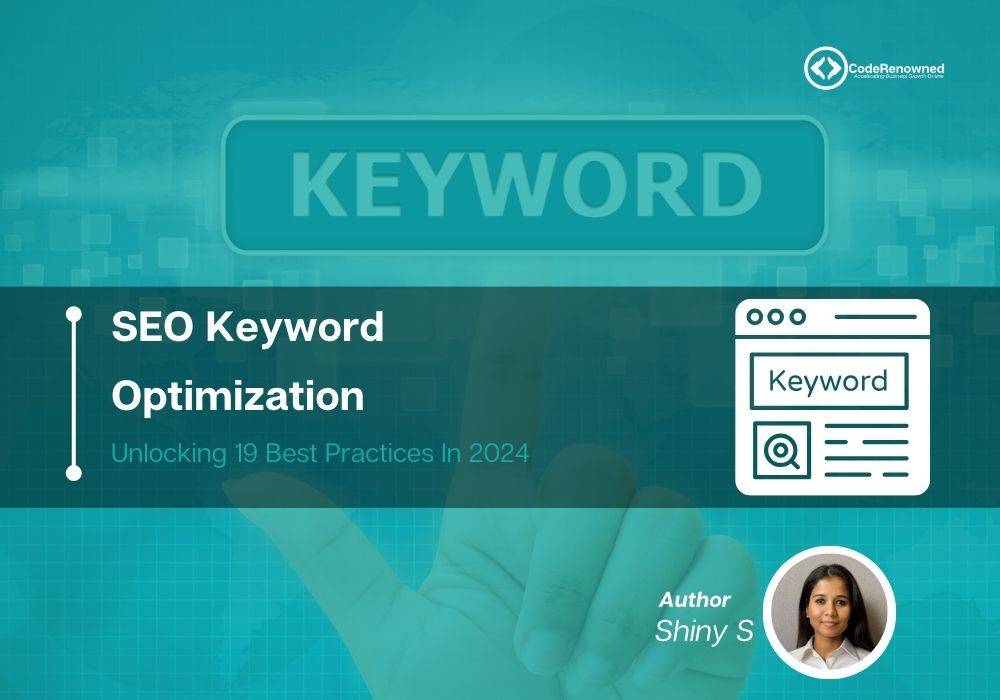SEO Keyword Optimization
Unlocking the Power of SEO Keywords: 19 Best Practices In 2024

SEO keywords are strategically chosen and incorporate specific words or phrases into website content to improve its visibility and ranking in search engine results pages (SERPs).
When users type these keywords into a search engine, the goal is for the website containing those keywords to appear among the top results, ideally on the first page. By targeting relevant keywords related to their business, products, or services, website owners aim to attract more organic traffic from search engines.
Importance of SEO Keywords:
Visibility and Ranking:
- Keywords are the primary standards by which search engines understand the relevancy of the content to user queries.
- Optimizing the content with relevant keywords can increase the likelihood of the website appearing in search engine results pages (SERPs) when users search for those terms.
- Ranking well for relevant keywords enhances your visibility and attracts organic traffic to the website.
Targeting Audience Intent:
- Keywords help to understand the intent behind users’ search queries.
- Identify and target keywords that align with the intent of the target audience (whether informational, navigational, or transactional).
- Tailor the content to meet their needs and preferences, increasing the chances of attracting qualified traffic to engage with the content or convert to customers.
Content Optimization:
- Incorporating keywords strategically throughout the website’s content, including headings, meta tags, body text, and image alt text, helps optimize search engines.
- These signals to search engine algorithms about the content, improving its relevance and increasing the likeliness of ranking for those keywords.
Competitive Analysis:
- Analyzing keywords can provide an understanding of the competitors’ SEO strategies and the search landscape in the industry.
- Identify high-value keywords to refine your SEO strategy, uncover new opportunities, and differentiate your content from competitors.
User Experience:
- Pick the right keywords and create high-quality content to enhance the overall user experience on the website.
- When users find content relevant to their search queries, they stay on the site longer, explore other pages, and potentially convert.
- Positive user experience can lead to higher engagement metrics and better performance in search rankings.
Long-Term Strategy:
- Keywords are a foundation for your SEO efforts and contribute to long-term success.
- Continuously monitor keyword performance, adapting to search trends and user behavior.
- Refine your keyword strategy over time to maintain and improve your website’s visibility and relevance in search results.
Keyword Types and Variations:
SEO keywords are several types based on their characteristics and usage. Below are some common types and variations of SEO keywords:
Short-tail or “head” keywords are brief and general terms of one to two words. They have a high search volume but are often highly competitive.
Examples: “shoes,” “laptops.”
Long-tail keywords are more specific and typically consist of three or more words. They are mostly less competitive but can attract highly targeted traffic.
Examples: “best running shoes for women,” “affordable best laptops under Rs.40,000.”
Branded Keywords include your brand name or variations of it. They are essential for building brand awareness, protecting brand reputation, and capturing branded search traffic.
Examples: “Nike shoes,” “Apple iPhone.”
Transactional Keywords indicate user intent to take a specific action, like purchasing, signing up for a service, or downloading a resource. Transactional keywords often include action-oriented terms like “buy,” “order,” “subscribe,” or “download.”
Examples: “order iPhone online” or “download ebook on SEO.”
Informational Keywords help when users seek information or answer their questions. Informational keywords often start with question words like “how,” “what,” “why,” or “where.” They are crucial for content marketing and attracting users in the research phase of their buyer’s journey.
Examples: “What is SEO,” or “Why is the sky blue.”
Local Keywords include location-specific terms essential for businesses targeting a local audience. These help to optimize the website for local search and attract users looking for products or services in their area.
Examples: “Pizza delivery near me” or “Hotels near me.”
Seasonal Keywords are relevant only during specific times of the year, like holidays, events, or seasonal trends. These keywords can help you capitalize on seasonal opportunities and drive targeted traffic during peak periods.
Examples: “Valentine’s Day gift ideas,” “year-end sales,” or “summer fashion trends.”
LSI Keywords (Latent Semantic Indexing) are terms and phrases semantically related to the primary keyword. They help search engines understand the context and relevance of your content. LSI keywords in your content can improve its comprehensiveness and power.
Examples: include synonyms, related terms, or variations of the primary keyword.
SEO Keyword Practices and Tips:
- SEO keyword strategies involve more than just selecting and optimizing keywords. Below are some advanced practices and tips for effective keyword optimization:
- Use advanced keyword research tools like SEMrush, Ahrefs, or Moz Keyword Explorer to identify high-volume keywords, analyze competitor strategies, and discover long-tail keyword opportunities.
- Provide a valuable understanding of search volume, keyword difficulty, and related terms, helping to refine your keyword strategy.
- Focus on semantic SEO by including related terms, synonyms, and variations of primary keywords throughout the content to help search engines understand the context and relevance of the content by improving chances of ranking for related searches and long-tail keywords.
- Develop a keyword mapping strategy to align specific keywords with relevant pages or sections of your website.
- Organize your keywords into thematic clusters and map them to corresponding pages to ensure each page targets keywords and search intent.
- Optimize the content for target keywords by including them in areas like page titles, meta descriptions, headings, and body text.
- Prefer user experience and natural language usage over keyword density and ensure that the content provides value and relevance to users.
- Conduct an in-depth SERP analysis to understand the search view for the target keywords.
- Analyze the types of content (e.g., articles, videos, infographics) that appear in search results, identify common themes and topics, and tailor the content accordingly to meet user intent and preferences.
- Prefer user intent optimization by creating content that aligns with the specific needs, questions, and intent behind users’ search queries.
- Understand the different types of user intent (informational, navigational, transactional, commercial investigation) and tailor your content to address this effectively.
- Target featured snippets, “People also ask” boxes, and other SERP features by optimizing the content to provide brief, definitive answers to common user queries.
- Structure your content in a format likely to be featured, such as lists, tables, or Q&A formats, and optimize meta tags and on-page content consequently.
- Monitor the performance of target keywords, track changes in search trends and user behavior, and adapt the keyword strategy accordingly.
- Review rankings, organic traffic, and conversion metrics to identify opportunities for optimization and refinement.
- Optimize the website and content for mobile devices, considering mobile search behavior and preferences.
- Optimize the content for natural language queries and conversational search patterns.
- Focus on long-tail keywords, question-based queries, and local optimization to align with voice search intent and the chances of appearing in voice search results.
Conclusion:
Creating effective SEO keywords is essential for improving the website’s visibility and driving targeted traffic. By conducting thorough keyword research, understanding the audience’s search intent, and strategically integrating relevant keywords into the content, you can enhance your website’s search engine rankings and attract qualified visitors.






